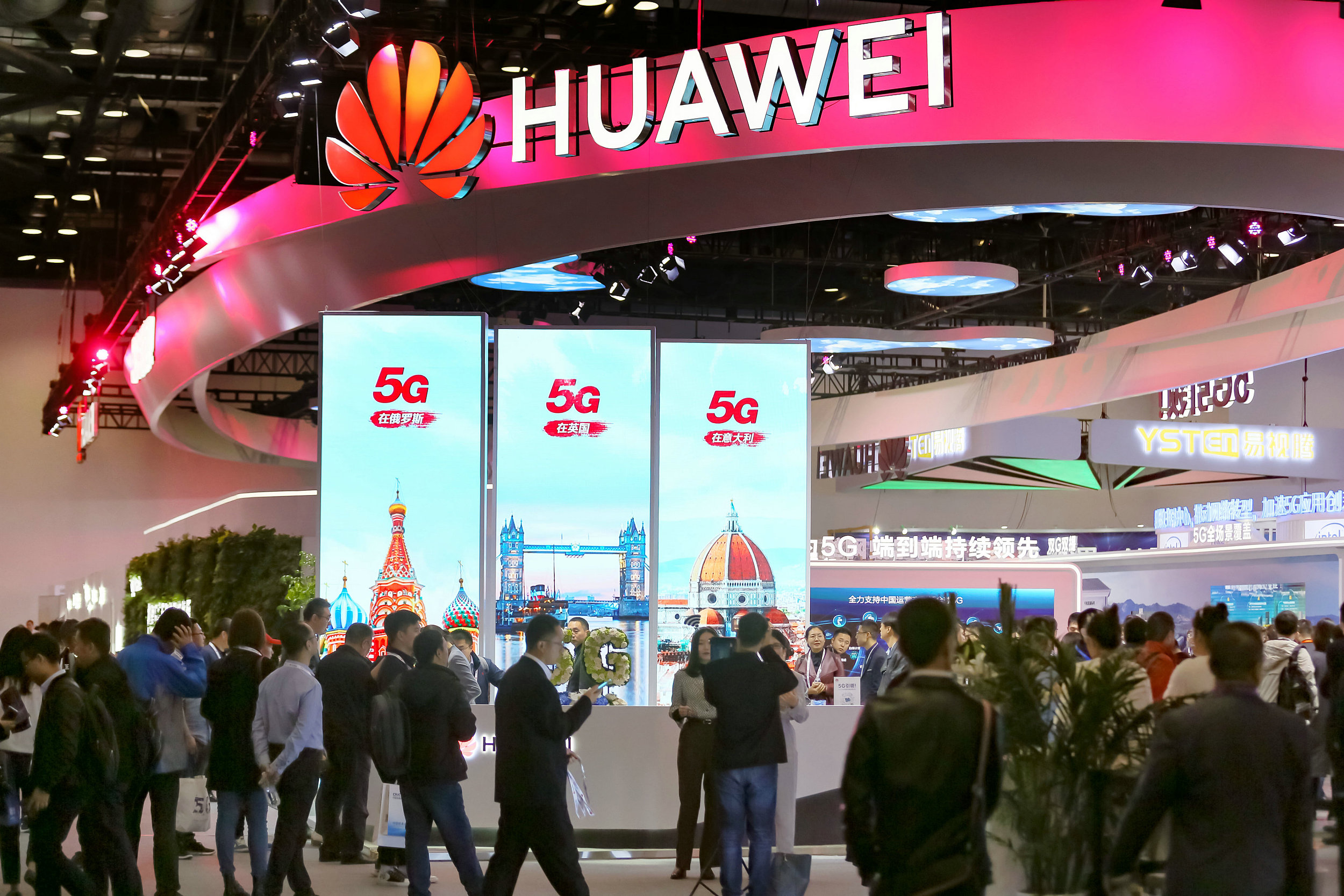
Huawei 5G exhibition stands in Russia, the UK and Italy at the Postal and Telecommunication Expo China on November 1, 2019. (PHOTO: VCG)
By QI Liming
According to a study by research company Opensignal shared with the Financial Times on December 28, 2023, UK mobile users had the slowest 5G download speeds among G7 countries in 2023. "The UK has lagged [behind] other nations on high-speed fifth-generation mobile phone networks in part due to disruption caused by the government’s ban on kit from Huawei," the study said.
Evidence has proven that blindly succumbing to external pressure and unreasonably suppressing other countries' technologies without taking into account its own realities, will eventually harm UK interests.
Under the pretext of so called "national security," which many Western media outlets revealed as rather being pressure from Washington, the UK government announced the banning of Huawei from its high-speed 5G telecommunications network in 2020.
Since then, the lack of investment in 5G, unbundling existing Huawei 5G equipment, and access to new operators and operating equipment are not only time-consuming and laborious, but also significantly slow down the process of updating the Internet, making it more difficult for the UK to seize the digital opportunities in the information age.
The reduced number of UK network operators has added to the concern that this could reduce choice for consumers and raise prices. Sylwia Kechiche, analyst at Ookla, said: "5G in the UK is in the lower performance category, and the risk of the UK falling behind can translate into slower economic growth."
According to Opensignal's study, UK mobile users had an average 5G download speed of 118.2 megabits per second between August 1 and October 29, 2023, down 13 percent from 136.5 mbps in the same period in 2022. That was significantly slower than in France, where mobile users tracked by Opensignal had the fastest average 5G download speed of 221.1 mbps.
Dean Bubley, director at advisory firm Disruptive Analysis, said 5G had been rolled out "fairly slowly" in the UK. In addition to the Huawei ban, he said there had been, "No real pull for the average user to deliberately seek it out."
Mobile industry executives highlight the decision to strip Huawei out of Britain's nascent 5G networks, "That absolutely put the brakes on deployment for the operators," said Matthew Howett, chief executive of Assembly Research.
According to another article UK in danger of falling behind on 5G, analysts warn published in Financial Times last August, the UK is in danger of becoming an also-ran in the global race to roll out high-speed fifth-generation mobile phone networks.
Despite being one of the first countries to start implementing 5G commercially in 2019, the UK is now falling behind because of limited investment by mobile phone operators and disruption caused by the government's ban on kit from Huawei, the article said.
Ofcom, the telecoms regulator, said last May that 5G mobile coverage from at least one operator was available at 82 percent of places where people live and work in the UK, but the figure falls to 22 percent for areas covered by all network providers. "The promise of true 5G is yet to be realized," said Paolo Pescatore, analyst at PP Foresight. "There's been a lot of hype around 5G with telcos having invested billions?.?.?.?and rolling out networks. Arguably, the UK has lost its place to be a 5G leader," he said.
According to UK Total Telecom, most consumers are not seeing a major benefit from 5G and so are unlikely to pay a premium for the technology. This has led telcos to increasingly target the enterprise segment to recoup their 5G investment, creating new 5G use cases and deploying bespoke private mobile networks. However, adoption in this space has been relatively slow, with major enterprises needing significant coaxing to shell out for 5G solutions.
The 40 million pounds funding announced by the UK government last August, aiming to turn local and regional authorities into "5G Innovation Regions," may go some way to help promote the further development of 5G in the UK, but projects of such a small size are unfortunately just a drop in the ocean when it comes to the scale of the 5G challenge facing the UK, said Total Telecom.
All these facts and concerns have proven Huawei's predictions to be true, when the UK announced banning the Chinese tech giant in 2020. "This disappointing decision is bad news for anyone in the UK with a mobile phone. It threatens to move Britain into the digital slow lane, push up bills and deepen the digital divide," Huawei's UK spokesman Ed Brewster said in a statement in response to the UK government's ban in 2020.
The trio will conduct a series of experiments in fields such as life science, fluid physics, combustion science and materials science. Notably, this is the first time that fruit flies have been taken on a Chinese space mission as experimental subjects. What made scientists choose fruit flies? What experiment will they undergo?
